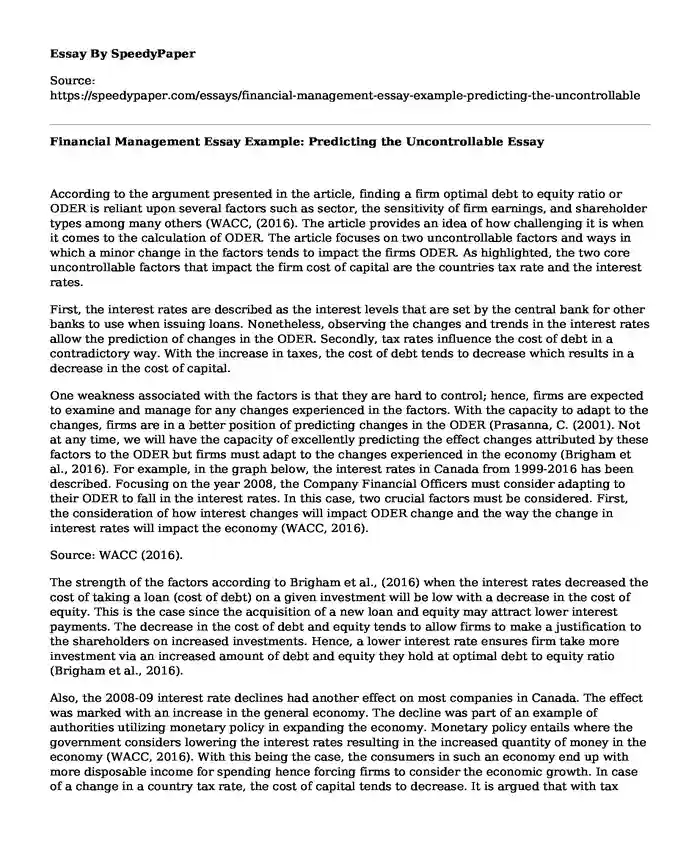
| Type of paper: | Article review |
| Categories: | Financial management |
| Pages: | 3 |
| Wordcount: | 663 words |
According to the argument presented in the article, finding a firm optimal debt to equity ratio or ODER is reliant upon several factors such as sector, the sensitivity of firm earnings, and shareholder types among many others (WACC, (2016). The article provides an idea of how challenging it is when it comes to the calculation of ODER. The article focuses on two uncontrollable factors and ways in which a minor change in the factors tends to impact the firms ODER. As highlighted, the two core uncontrollable factors that impact the firm cost of capital are the countries tax rate and the interest rates.
First, the interest rates are described as the interest levels that are set by the central bank for other banks to use when issuing loans. Nonetheless, observing the changes and trends in the interest rates allow the prediction of changes in the ODER. Secondly, tax rates influence the cost of debt in a contradictory way. With the increase in taxes, the cost of debt tends to decrease which results in a decrease in the cost of capital.
One weakness associated with the factors is that they are hard to control; hence, firms are expected to examine and manage for any changes experienced in the factors. With the capacity to adapt to the changes, firms are in a better position of predicting changes in the ODER (Prasanna, C. (2001). Not at any time, we will have the capacity of excellently predicting the effect changes attributed by these factors to the ODER but firms must adapt to the changes experienced in the economy (Brigham et al., 2016). For example, in the graph below, the interest rates in Canada from 1999-2016 has been described. Focusing on the year 2008, the Company Financial Officers must consider adapting to their ODER to fall in the interest rates. In this case, two crucial factors must be considered. First, the consideration of how interest changes will impact ODER change and the way the change in interest rates will impact the economy (WACC, 2016).
Source: WACC (2016).
The strength of the factors according to Brigham et al., (2016) when the interest rates decreased the cost of taking a loan (cost of debt) on a given investment will be low with a decrease in the cost of equity. This is the case since the acquisition of a new loan and equity may attract lower interest payments. The decrease in the cost of debt and equity tends to allow firms to make a justification to the shareholders on increased investments. Hence, a lower interest rate ensures firm take more investment via an increased amount of debt and equity they hold at optimal debt to equity ratio (Brigham et al., 2016).
Also, the 2008-09 interest rate declines had another effect on most companies in Canada. The effect was marked with an increase in the general economy. The decline was part of an example of authorities utilizing monetary policy in expanding the economy. Monetary policy entails where the government considers lowering the interest rates resulting in the increased quantity of money in the economy (WACC, 2016). With this being the case, the consumers in such an economy end up with more disposable income for spending hence forcing firms to consider the economic growth. In case of a change in a country tax rate, the cost of capital tends to decrease. It is argued that with tax rates increase, the cost of debt decreased which ultimately results in a decreased cost of capital.
In summary, the article has described ways in which changes in the two core uncontrollable factors tend to impact the ODER but coming up with a real level of debt and equity to attain an ODER remain difficult.
References:
Brigham, E. F., Ehrhardt, M. C., Nason, R. R., & Gessaroli, J. (2016). Financial Managment: Theory And Practice, Canadian Edition. Nelson Education.
Prasanna, C. (2001). Financial Management Theory and Practice. Tata McGraw-Hill Publishing Co. Ltd., New Delhi, India.
WACC, (2016). Uncontrollable Factors. Retrieved on 13th September, 2018, from: https://bradenmurrayfinanceblog.wordpress.com/2016/03/07/wacc-uncontrollable-factors/
Cite this page
Financial Management Essay Example: Predicting the Uncontrollable. (2022, Jul 28). Retrieved from https://speedypaper.net/essays/financial-management-essay-example-predicting-the-uncontrollable
Request Removal
If you are the original author of this essay and no longer wish to have it published on the SpeedyPaper website, please click below to request its removal:
- The Impact of Green IT Systems on Environment. Free Essay Sample.
- Essay Example on the Video about Legalizing Marijuana
- Free Essay Example on African Diaspora
- Free Essay on Ikea's Generic Competitive Strategies
- Case Study: HIPAA, CIA, and Safeguards, Free Essay for Everyone
- Essay Sample on Campari Tomato
- Essay Sample on The Learner-Focused Assessment
Popular categories




